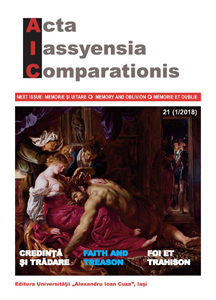“The Whip and the Scythe:” Symbols of Betrayal in William Faulkner’s Wash
“The Whip and the Scythe:” Symbols of Betrayal in William Faulkner’s Wash
Author(s): Iulia-Andreea MilicăSubject(s): Comparative Study of Literature
Published by: Editura Universităţii »Alexandru Ioan Cuza« din Iaşi
Keywords: Southern plantation; symbolism; white trash; patriarchy; tragedy; revenge;
Summary/Abstract: The short story Wash that was a source of inspiration for the novel Absalom, Absalom! is a subtle representation of the class conflict in the Southern slave system. Beyond that, however, Faulkner also alludes to more intense and deeper human realities: humanity in the face of humiliation and destruction. The use of the symbols is indicative in the construction of the short story. The “whip” and the “scythe”, therefore, come to represent the people who choose to wield them, reflecting not only their social classes but also the roles they fulfill in the story. Thus, if at the beginning the class distribution seems to be in keeping with the slave ideology promoted in the Southern plantation romance, with the whip representing the rich class and the scythe the poor farmers, by the end of the story, the utter inhumanity of the planter is exposed and the dream of the aristocracy is torn apart. The scythe, then, becomes the symbol of revenge and rebellion, the weapon of “Death”. The paper will focus on complex the meaning of these symbols in the context of a revenge story with echoes from the Greek tragedy.
Journal: Acta Iassyensia Comparationis
- Issue Year: 1/2018
- Issue No: 21
- Page Range: 51-61
- Page Count: 11
- Language: English

